State Department officials and agency watchers were probably very happy with Mike Pompeo’s responses during his confirmation hearing before the Senate Foreign Relations Committee last Thursday. Pompeo essentially promised to return the department to its pre-Tillerson existence. But while a restoration of the department as it was circa 2016 might be an improvement over the current state of affairs, it would still leave the department broken, adrift, and without the prospect for meaningful reform.
The most significant casualty of the Tillerson era was not the dozens of senior-level personnel who were pushed out or the aspiring foreign service officers who were not permitted to join the service. Rather, it was the much-maligned “redesign” effort itself (also known as the “reorganization” and “impact initiative”). Almost without exception, anyone who has worked within or alongside the department knows the agency is in need of systemic reform. During the early days of the Tillerson tenure, there was strong bipartisan support in Congress for Tillerson’s proposed effort—some called for a Goldwater-Nichols Act for the Department, a reference to the lengthy and deeply involved process that resulted in legislation overhauling the Department of Defense in the 1980s.
Tragically, Tillerson’s reform effort was a complete and utter failure. There were countless errors of judgment and execution over the past 13 months, but several stand out:
- Massive budget cuts were proposed even before the reform review process was complete, which led many to conclude that Tillerson was motivated by a desire above all to shrink the department;
- A justifiable hiring freeze was instituted to ensure the reform process could move ahead unfettered but Tillerson never initiated reforms to improve recruitment and retention. And to pile on, the hiring freeze was kept in effect longer than in any other agency;
- Senior-level positions (including important ambassadorships) remained vacant and incumbents were pushed out;
- Policymaking was concentrated in the hands of a few loyalist political appointees while the bureaucracy was cut out;
- All of the above severely damaged morale, but Tillerson largely didn’t acknowledge that fact; and
- Most importantly, Tillerson never answered the fundamental question: “what is the department uniquely qualified to do?”
Unlike his would-be predecessor, Pompeo acknowledged the low morale of department employees and pledged to turn it around. He promised to fill the numerous senior-level vacancies at the department—an issue that has drawn condemnation from Congress, notable former department officials, and the foreign policy community more broadly. And he promised to fight for State Department resources in contrast to his predecessor, who twice sanctioned budget requests which proposed nearly 30-percent cuts to the agency.
In his opening statement, Pompeo told senators, “you have my commitment, too, that I will work with each of you, the White House and the entire Senate to fill the senior [personnel] vacancies.” Later, Pompeo committed to Sen. Jeanne Shaheen (D-N.H.) to repeal the agency’s hiring freeze and “move forward as quickly as possible and fill vacancies that exist within the State Department.” He also pledged to “make the case to defend the resources the department needs” and unlike Tillerson, if given more resources he’d “figure out ways to add value to create American national security value with resources.”
All of this was probably music to the ears of many in the foreign policy community. It was certainly the rhetoric that the committee’s senators wanted to hear.
One thing the committee did not want to hear about was agency reform. Not a single senator asked Pompeo about the future of Tillerson’s “redesign” effort and no senator asked Pompeo how he might institute needed and long-overdue reforms. Members of the Senate Foreign Relations Committee—like many inside the department—have had enough of reorganization plans and disgruntled State Department watchers. Unfortunately for the ailing agency, based on last week’s questions, it seems very unlikely that the committee will be focused on reform.
For Pompeo’s part, his written testimony seemed to indicate that reform is part of his agenda. The issue that he said will be his “first priority” is to ensure personnel “have a clear understanding of the President’s mission” for the agency. He indicated a desire to “break down unnecessary layers of approval” and “encourage our officers to be creative and take risks when required” as he did in his previous role as CIA Director. Pompeo promised to improve workforce culture, in part, by addressing concerns that relate to deployed families. Unfortunately, committee members did not ask Pompeo to elaborate on his priorities.
Congress does not appear interested in holding Pompeo accountable for the continued decline of the Department; in their eyes, simply rolling back the Tillerson era would be a success. For those inside the department, morale is so low that the promise of a more nimble, responsive and effective agency seems like a pipedream. They’ll settle for a modicum of stability and consistency. Without congressional pressure, and with the overwhelming desire from those inside the department to return to a pre-Tillerson state of normality, any energy for agency reforms will have to come directly from Pompeo.
In December, I made the case that the reform effort must go on if/when Tillerson was replaced. The Department of State is increasingly becoming a marginal player in U.S. foreign policy as successive administrations concentrate policymaking in the National Security Council and other agencies expand their areas of operation and presence overseas. Simply returning the State Department to its position at the end of the Obama presidency would make no significant improvement on the department’s long-term trajectory. Significant systemic problems persist and if unaddressed threaten to make the department largely irrelevant in the future.
If Pompeo really wants to “execute diligent and firm diplomacy, working alongside the world’s finest diplomatic service,” he’ll need to do more than roll back the clock. He will need to be a reformer.
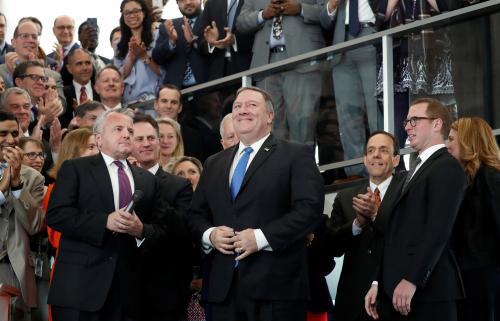
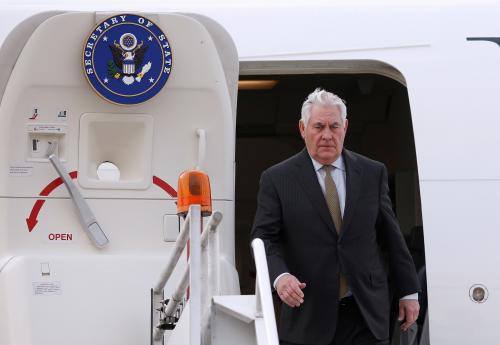
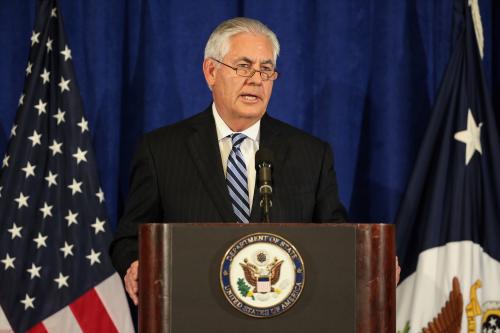

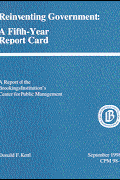



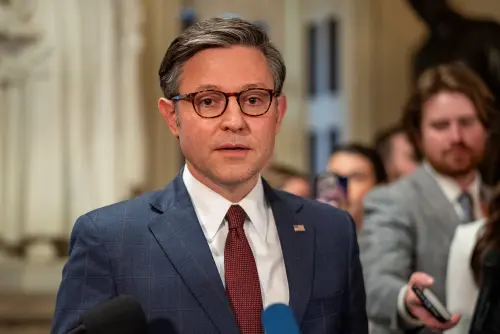

Commentary
Why nobody should be cheering Pompeo’s pledge to restore State Department
April 16, 2018